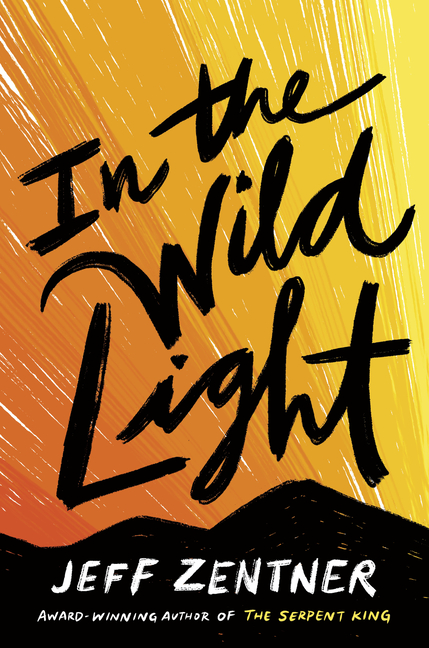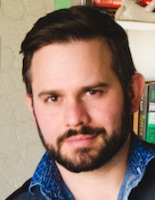Meet-the-Author Recording with Jeff Zentner
In the Wild Light |
Jeff Zentner introduces and shares some of the backstory for creating In the Wild Light.
Translate this transcript in the header View this transcript Dark mode on/off
Jeff Zentner: Hello, my name is Jeff Zentner. I'm the author of In The Wild Light. In The Wild Light, well, I describe it as my Dead Poet's Society meets Looking for Alaska book. All of my books proceed from pop cultural properties that I love, and that were formative for me, and that movie and that book were formative for me. It is a story of two kids from rural East Tennessee. For those of you who aren't familiar with the region, that's the Appalachian part of Tennessee, and it's beset by a number of problems, including opioid addiction. Both of these kids, they met in a support group for teens whose parents are struggling with addiction. They've become best friends. One of these kids, Delaney, is a genius, and she discovered a mold in a cave along their favorite river in East Tennessee, along the Pigeon River, and this mold has incredible antibiotic properties. She discovered these properties and managed to get it into the hands of medical professionals who could publish their results, and which in turn brought her great renown.
This renown resulted in her getting a scholarship to an elite Connecticut private school called Middleford Academy. It's a fictional school. Well, Delaney is intensely loyal to her best friend Cash Pruitt, and she would only accept the scholarship on the condition that they extend one to Cash as well. Well, Cash is not quite as adventuresome as Delaney. He loves his home, he loves the mountains where he lives, he loves his river, but most of all, he loves his grandparents who raised him after his mother died of a drug overdose, and particularly his grandfather who he calls his papaw in the parlance of East Tennessee. His papaw is dying of emphysema, and so he doesn't know how much longer he has left with his papaw, who is his father figure, his best friend outside of Delaney, so he's very reluctant to leave him. But his grandparents want him to take this opportunity that Delaney is offering that they could never give him.
There's a question that I deal with in every book, which is, how do we recover from the traumas that are part of our history? How do we come into our own personhood? How do we become our own people? There's a passage in this book that I really like where one of the characters says to another one of the characters, "You are not a creature of grief. You are not a congregation of wounds. You're not the sum of your losses. Your skin is not your scars. Your life is yours, and it can be new and wondrous." I think that's kind of what I'm trying to say with every book.
I'm going to read the first chapter of In The Wild Light.
Chapter One. The human eye can discern more shades of green than of any other color. My friend Delaney told me that. She said it's an adaptation from when ancient humans lived in forests. Our eyes evolved that way as a survival mechanism to spot predators hiding in the vegetation.
There were as many tinges of understanding as there are hues of green in a forest. Some things are easy to understand. There's a natural logic, a clear cause and effect, like how an engine works. When I was eleven, my papaw pulled the engine out of a Chevy pickup and took it apart, letting me help him rebuild it. He laid the pieces out, reeking of dark oil and scorched steel on a torn and greasy sheet, like the bones of an unearthed dinosaur. As we worked to explain the function of each piece and what it contributed to make the engine run, it made sense how he said it. He wasn't sick then. Later when he was, I understood that when he used to say, "Don't nobody live forever!" when accepting another piece of his sister Betsy's chess pie, that wasn't just a phrase he used. That was when he still had an appetite.
Now, his appetite has moved to his lungs, which are always starved for air. His breathing has the keening note of the wind blowing over something sharp. It's always there, which means he has something sharp inside him. People can't live long with sharp things inside them. I understand this. Some things I understand without understanding them, like how the Pigeon River moves and pulses like a living creature, never the same twice when I'm on it, which is as often as I can be, or how sometimes you can stand in a quiet parking lot on a hot afternoon and perfectly envision what it would have looked like there before humankind existed. I do this often. It brings me comfort, but I don't understand why. Other things I don't understand at all. How Delaney Doyle's mind works, for example. Trying to comprehend it is like trying to form a coherent thought in a dream. Every time you think you're there, it blurs.
This Meet-the-Author Recording with Jeff Zentner was exclusively created in July 2021 by TeachingBooks with thanks to Random House.



